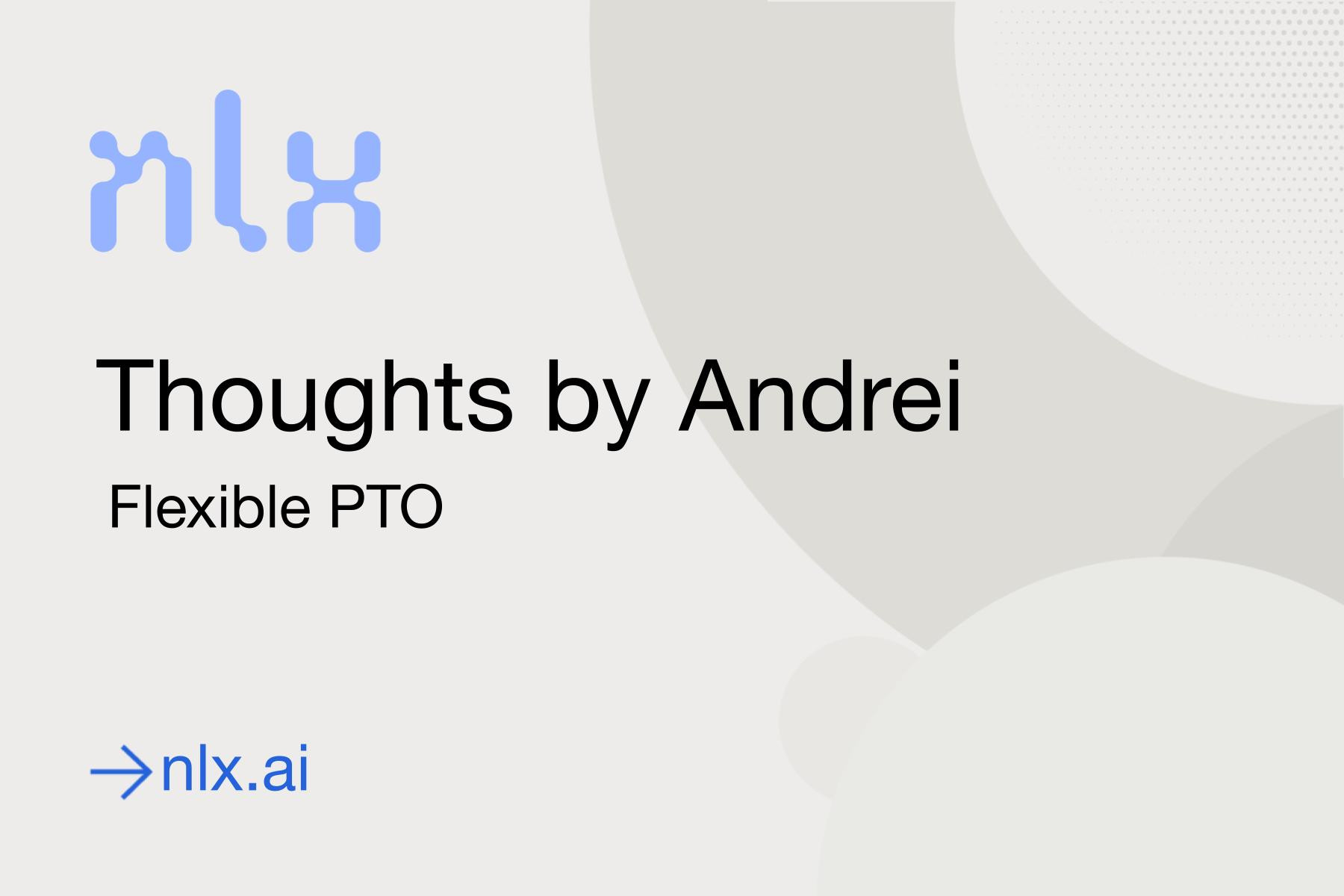
Flexible PTO
My focus has been and always will be people-first. I’ve applied this in a variety of ways, building it into technology over the years, and now instituting it into company culture and policy at NLX. With summer just around the corner, and it being peak travel season for airlines, my thoughts have drifted to vacation and our vacation policy.
NLX’s flexible vacation policy is one that I’m particularly proud of. The policy reads:
At NLX, we have a culture of personal responsibility and mutual trust, and our vacation and time off policy reflect that. We recognize the need for employees to take time away from the office to creatively recharge, and that not everyone works the best during traditional 9 to 5 office hours. We also believe in taking personal responsibility for managing our own time, workload, and results. To that end, we’ve adopted a Flexible PTO (Paid Time Off) policy, in which each employee is afforded the flexibility to take a vacation, take time off for illness, and shift schedules as necessary. Unlike a traditional PTO policy, our policy does not run off of strict guidelines on how many days or when taking off work is appropriate.
- Requirements:
- Flexible PTO only applies to vacation and sick time off. For pregnancy, medical and other leaves, please see applicable policies or talk to HR.
- We encourage our team to use this program and have set a minimum of ten days a calendar year for usage.
- We do not limit employee vacation times or sick days – take the time you need to operate at peak performance. Employees are welcome to shift their schedules to match their work style.
The policy continues to outline employee and manager responsibilities, but overall, it is simple, easily accessible, and enforced by our company culture.
Though very similar, we decided to call our policy “Flexible PTO” (FPTO) over “Unlimited PTO” (UPTO) for a few reasons.
Our Head of People, Melanie Vargas, who guided us in making the distinction explains, “UPTO is too scary! Oftentimes with UPTO, we see employees not using it... The lack of definition of UPTO is almost too intimidating and too vague.”
“For these reasons, NLX decided to institute FPTO. Inside NLX’s FPTO policy, we list a minimum number of days off employees are required to take, because yes – we want our employees to take off, stay fresh, and not get burnt out! Additionally, the FPTO policy is better defined, with the ultimate goal of it encouraging employees to take it when it fits best with their life. The overall goal of our FPTO program is to give our employees time off, but also give them important flexibility to meet the needs of their families and lives. We care about their wellbeing. ”
The difference between the two is subtle but important! I want my team to live full lives outside of work. Maybe one year, 15 vacation days was all you felt like you needed. But maybe the following year, you needed to plan a wedding and you took 27 days off. I want my team to have that time, and FPTO encourages them to take it.
A good vacation policy is really important to employees! According to a recent survey of 2,000 workers by the Harris Poll for Fortune, “50% of workers would rather have flexible time-off policies than higher pay.” Though half value time over money and the other half value money over time, at the end of the day, time is money, and that’s what employees are looking to gain and spend as they please. And if you’re looking to attract and retain top talent, then you’ll need good benefits like FPTO to meet your employees’ priorities.
Now that said, we take responsible steps to try our best to alert colleagues when we’ll be out and when we expect to return. Furthermore, we ensure there’s a plan in place to cover that colleague amongst a team so the work is better distributed. Each person is accountable for making sure things get done, as is their manager.
Our policy also acknowledges there will be times when advanced notice isn’t possible and we encourage team members to go take care of what they need to do (or not do).
I realize such a policy might not be immediately feasible in every industry at every company at every time. There are busy seasons that might require as many hands on deck as possible, but overall I strongly believe that having a healthy culture and creating an infrastructure that allows for flexible vacation policies is key to a company’s success and for employees to thrive!
And that end-outcome — where an employee is recognized as a full person and is encouraged to take the time they need — pays more dividends in my perspective than any other restrictive policy. As a firm believer in having an employee-first company culture, I’ve asserted this before and I’ll say it again… take care of your people (and let them take care of themselves), and they will take the best care of your company and customers.
